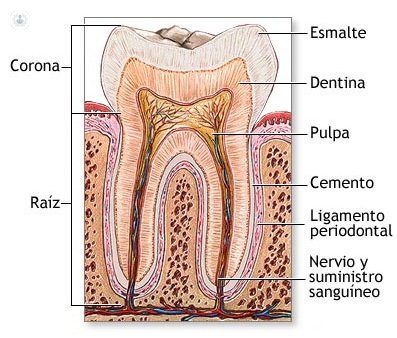What is a root canal?
Written by:Endodontics keeps your natural teeth, bone and gum surrounding and functionality. Helping to conserve a natural smile, eat comfortably and with proper care can last as the rest of your teeth.

What is a root canal?
The specialist dentistry endodontics considered necessary when the pulp is irreversibly affected by deep decay, trauma or injury endoperiodontales. In these cases the tooth can become sensitive to cold, heat or chewing. The pain may be intermittent or constant. Even the tooth can change color or may appear an abscess or fistula. There could also be advised on teeth that require large carved for the subsequent placement of crowns or bridges.
Endodontics, surgery
To reach the pulp tissue (nerve) is required access to the channels through which flows the dental nerve. Once achieved, various instruments and liquids that help the removal and dissolution of the pulp tissue are used, and to disinfect and properly settle the duct system.
Once the pulp tissue removed and the conduit is clean and dry, we proceed to its sealing or filling. This filling totally occupy the space of the duct in order to leave the least possible place for bacterial growth.
It is not a painful procedure because it is performed under local anesthesia. Finishing the last treatment and the effect of anesthesia, some discomfort may occur for a few days, especially with chewing, due to postoperative inflammation of the tissues surrounding the tooth. In these cases adequate medication is required.
In most cases the treatment is done in a single visit of between 30 and 60 minutes depending on the part to be treated. While sometimes the patient's condition, the technical difficulty of the case, professional experience or other parameters, two or more sessions may make necessary.
Care after endodontics
After the root canal is necessary to restore the tooth crown, so that the root canal is protected and can not be produced entry or saliva or bacteria. Once the tooth restored, it is necessary to keep appointments for review that tells you your dentist.
FAQ endodontics
- You can perform a root canal on an abscess? You can not only but in most cases the best treatment is to solve this problem. An abscess is caused by the existence of an infection in the tissue around the tooth, often due to a disease of the pulp (nerve). With endodontics remove the diseased pulp and got disinfecting ducts tooth.
- An endodontic tooth need any special care? After a successful root canal treatment and final restoration of the tooth by your dentist or dentist, the tooth will behave like the others, both in function and in duration, requiring the same health care, prevention and periodic reviews than any other tooth. In some cases where any past injury in the tissue surrounding the tooth, curing the same will be needed.
- Are fragile teeth after a root canal? The endodontic teeth do not have to be more fragile than others, provided they are properly restored. In cases of posterior teeth, it may be appropriate to protect the cusps through appropriate reconstructions or crowns, for durability thereof. It is important to see a dentist regularly (at least an annual review) to prevent tooth decay or other factors that may influence the prognosis of endodontic tooth. It is essential not to delay too much the restoration of endodontic teeth to avoid any complications or fracture thereof.
- Is there an alternative to endodontics? Our first priority must be to try to keep the natural dentition. When this is not possible, the alternative is the removal and replacement of the tooth; but keep in mind that any form of substitution, including the implant, can compete with a natural tooth in terms of aesthetics or proprioception refers. The only three contraindications to maintain a tooth in the mouth by a root canal are: the presence of a vertical fracture, an unfavorable ratio between the crown and root or insufficient periodontal support. They are the only cases that must evaluate the alternative to endodontics. Scientific studies show a similar success rate between the endodontic tooth and implant. However, while studies endodontic determine the success or failure based on clear and well defined parameters; studies analyzing the prognosis of the implants usually survival studies, ie only observed if a certain time the implant is or is not in the mouth, but not usually consider whether there are associated complications or other important quality parameters .
- What is an endodontist? He's a dentist or dentist who has the expertise and technical facilities for carrying out any kind of treatment in the field of endodontics, since cases simplest to the most complex, retreats / reendodoncias and surgery endodontic.
- What is a root canal with rotary stuff? It's a system of endodontic files produced nickel-titanium, these files are more flexible than stainless steel traditionally used. This flexibility allows us to treat curved canals, in turn significantly reduces treatment time and achieves a better cleaning of the root canal that results in a better sealing of the root canal.
- An endodontic tooth, can get cavities? As mentioned above, an endodontic tooth decay may have. When performing a root canal or remove the pulp tissue nerve, we do not change the composition of the tissues of the tooth, therefore, the tooth has an equal chance of developing cavities than a completely healthy tooth. Hence, it is important to go to the reviews as directed by the dentist.



